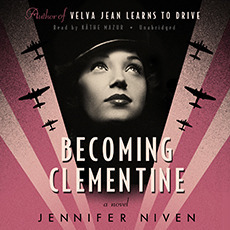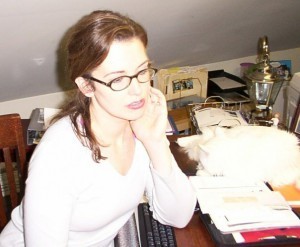Jennifer Niven's Blog, page 551
October 19, 2012
Traveling light when you love books
The first time I traveled to England, I packed my suitcase full of books by my favorite English authors– the Brontes, Jane Austen, Keats, Byron, Shelley, Wordsworth, and the complete works of Shakespeare. I could picture it so clearly, so vividly… I would read all of them while traveling through their country. I would absorb the words of these great writers while surrounded by some of the very scenery that inspired them.
And then I got to England, making my way across Wales and the British countryside before settling in London, without ever opening a single book. What’s more, I bought so many lovely old editions of Byron and Shelley and Jane Austen and the Brontes at charming, musty bookstores throughout the United Kingdom, that I had to purchase another suitcase just to get them home.
As I head to Ireland next week (in an attempt to remember what a vacation actually is), I’m trying very hard not to fill my already-filled suitcase with all the Irish literature I can carry: Bram Stoker’s Dracula (my favorite gothic horror story)– Dracula may have hailed from Transylvania, but Stoker himself was Irish. Oscar Wilde’s The Importance of Being Earnest (my favorite play). Roddy Doyle’s Paddy Clarke Ha Ha Ha (my favorite modern Irish-set novel). Anything by Marian Keyes. And Yeats, ah Yeats, who penned my favorite poem.
 Instead, I have allowed myself one book for the journey there, and one (purchased there) for the journey home. (This doesn’t count any books I may have on my iPad, of course. Especially because when I’m in wonderfully olden-time countries like England and Ireland, I want to read wonderfully olden-time books, complete with tattered covers and yellowed, crumbling pages.) I plan to experience Ireland off the page.
Instead, I have allowed myself one book for the journey there, and one (purchased there) for the journey home. (This doesn’t count any books I may have on my iPad, of course. Especially because when I’m in wonderfully olden-time countries like England and Ireland, I want to read wonderfully olden-time books, complete with tattered covers and yellowed, crumbling pages.) I plan to experience Ireland off the page.
And that extends to my own work. I am going to do my best not to start researching and writing (in my head) the entire time I’m there.
(Although who knows what stories I may stumble across…)
When You Are Old and Grey
by William Butler Yeats
When you are old and grey and full of sleep,
And nodding by the fire, take down this book,
And slowly read, and dream of the soft look
Your eyes had once, and of their shadows deep;
How many loved your moments of glad grace,
And loved your beauty with love false or true,
But one man loved the pilgrim soul in you,
And loved the sorrows of your changing face;
And bending down beside the glowing bars,
Murmur, a little sadly, how Love fled
And paced upon the mountains overhead
And hid his face amid a crowd of stars.
The post Traveling light when you love books appeared first on Jennifer Niven : Everything Books.
October 18, 2012
Extra Extra! Read About Me!

I woke up to a headache this morning. It was the type that you feel like you’ve been stabbed by an icepick. I covered my eyes, groaning. I get terrible migraines during the fall; I know it has to do with allergies. Ida B who was sleeping with me jumped off the bed. I managed to turn off the alarm, then stumbled in the bathroom. I took an Bayer, then a hot bath to loosen up the nasal passages. I went back to bed, feeling hungover without having the pleasure of being drunk the night before.
I woke up around 12. I knew I had to get up, otherwise my sleeping schedule would be screwed up. I turned out the comptuer and saw a note from Maeve Magazine. My essay “Why I Still Love ET” was published today. Plus I was published in The Jonestown Report last Saturday.
Seeing that my whole body relaxed. I made myself get dressed and to celebrate got an iced tea at Peet’s and read Stephen Colbert’s new book. I laughed until people stared at me. But I felt better. And incredibly lucky.
So if you want to read me, me, and oh yeah, me, here’s some info for you.
You’ve Got To Pick Up Every Stitch
The post Extra Extra! Read About Me! appeared first on Jennifer Niven : Everything Books.
October 14, 2012
Oh Carrie, You’re So Very
My first semester at Mills they were having a horror movie night. What was the movie? Carrie. I was so there. The girls loved the movie, although some of the scenes were unintentionally funny (the naked gym scene at the beginning), cheered when John Travolta graced the screen, then screamed in horror at the end. I sat there thinking, yeah. They get it. They get the movie.
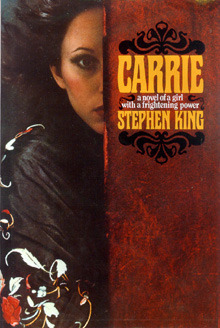
We need to backtrack: Forty years ago Stephen King went with a friend to a high school girls’ locker room. His friend pointed out how the girls had walls around the showers so they could have privacy, plus a Kotex machine. Interested, King went home and wrote it as a short story, but threw it away. His wife Tabitha saved the pages, told him that he should do something with it. And sure enough he did.
Thanks, Ms. Tabitha King. (The story is taken from his wonderful memoir/handbook, On Writing) Thanks for being smart enough to know your husband’s writing and know it would work, and thanks for the book Carrie. But I want to focus on the movie made from the book.
To begin with, I’m not into horror movies. Oh, sure, I love a Hitchcock thriller, but I could never understand the appeal of Halloween, Scream, Nightmare on Elm Street. But the one horror movie that spoke to me when I was fourteen was Carrie.
Who could forget that opening scene when Carrie (Sissy Spacek) is in the back row, playing volleyball. The teacher (amazing Betty Buckley) encourages the other girls to let Carrie hit the ball. You know this will not go well (or maybe it’s because I’m terrible at volleyball). Carrie misses the serve. A girl hits her with her baseball hat. Another girl with feathered blonde hair swears at her. At fourteen I thought, God, I’m not the only one. But watching it was awful.
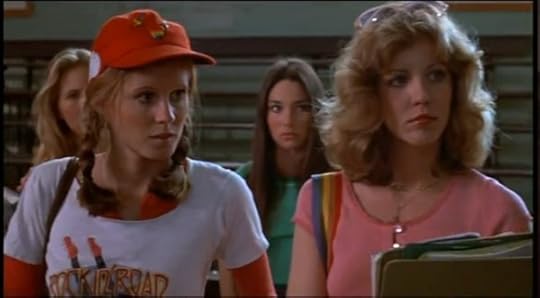
We then see the girls changing in the locker room in various stages of undress. Carrie is taking a shower after PE class, and blood is going down her leg? Not knowing what is going on, she is positive she is bleeding to death. She cries out in fear. In utter cruelty, the girls in her class throw tampons and pads at her yelling at her to “plug it up, plug it up, plug it up!” Because of this scene I was terrified of changing in my high school locker room. Even though the showers didn’t work. And I knew the basics of menstruating (Thank you Judy Blume!)
That scene is the the start of the unraveling of Carrie White. She lives in an old house with her mother Margaret (Piper Laurie) who is obsessed with Christianity and goes door to door to spread the Word. She’s the type that gives Christians a bad name. After learning Carrie gets her period… well, let’s say this: they don’t have a lovely mother-daughter bonding moment. Margaret brands Carrie as a sinner and locks her in a closet to pray for forgiveness. In that scene, when Carrie looks helplessly at the cross, you can feel how sad she is and the damage of child abuse.
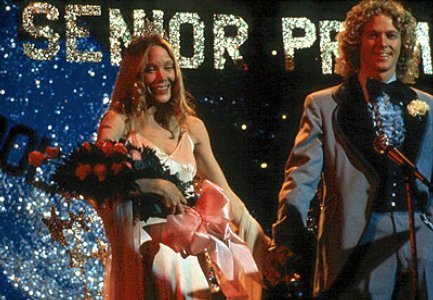
In the meantime, Sue Snell (Amy Irving) feels guilty and decides to try to make it up to Carrie by asking her boyfriend Tommy (William Katt) to take Carrie to their prom. He agrees, mostly because he’s a decent guy, plus Carrie liked a poem he wrote for their English class.
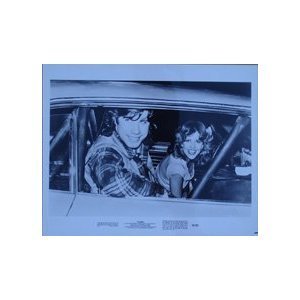
In the meantime, Carrie has discovered she has a gift to move things or make things happen: breaking a mirror, make a kid fall off his bike after he teases her. She is amazed by her new powers, and is amazed that Tommy asks her out to the prom. She accepts after a pep talk from Ms. Collins.
In the meantime, Chris Jorgerson (Nancy Allen, the girl with the great feathered hair) plots revenge; because of the prank at the locker room, the girls are assigned to after-school detention. Chris leaves early, forfeiting her prom tickets. She plots revenge with her boyfriend Billy (John Travolta). In one classic scene, the two of them are in his car, listening to “Heat Wave” by Martha Reeves, and Travolta eyes her breasts. There’s no embarrassment to it– it’s so matter of fact, so teenage boyish, it gives you shivers down your spine.

The night of the prom comes, and Carrie is thrilled. Chris arranges it so that they win for King and Queen. And that’s when things go wrong. And Carrie unravels. Let’s say this: it’s not pretty.

Carrie works on so many levels; the direction by Brian DePalma is so good as he shows a town that is so small that everyone knows everyone. In Carrie’s case, that’s not a good thing. All the actors are great– Travolta, Amy Irving, and William Katt. One of my favorite scenes is when Katt goes with his friends to try on tuxedos. It’s so seventies (they of course go with the ruffled tuxedos), but also so true and bonding.
But it is Sissy Spacek that is the heart and soul of this movie as Carrie. All Carrie wanted, as good Jon Lovitz (as Harvey Firestein) once said, is to be loved. Is that so much to ask? When people pay attention to her (Tommy, Ms. Collins), she blooms. In one scene she tries on lipstick in the drug store, trying to see what looks good on her, feeling like a pretty girl. This wasn’t a girl who wanted to kill her classmates and her teachers. This wasn’t a girl who was evil. This wasn’t a girl who had malice in her heart. She just wanted to be loved, to be pretty, and go to the prom and have a good time. Spacek makes Carrie real, and she makes us love her, and she makes us cry as she goes on her rampage.
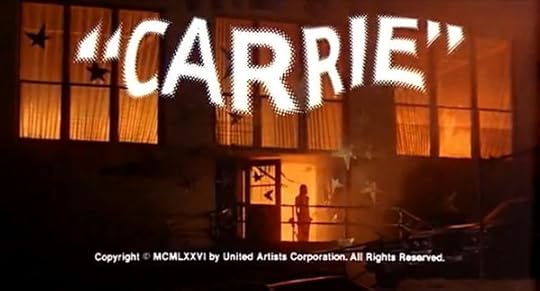
They’re remaking Carrie, and to me that feels so wrong. First off they’re setting it in current day, and I’m sorry, but Carrie is so seventies. It is platform shoes and tuxedo shirts, frosted hair and macrame purses. Yet bullying is still there; a friend just shared a YouTube video a girl made, saying she was killing herself “because of them.” When I saw Carrie at fourteen I felt a release when she finally took her revenge, because I hated the bullies who made fun of me in school. But now it is so forbidding; back when Carrie was made, Columbine was a flower, not a symbolism of high school shootings. Maybe someday, bullying will be as dated as Chris’s hairdo. One can only hope.
The post Oh Carrie, You’re So Very appeared first on Jennifer Niven : Everything Books.
October 13, 2012
Stick It
Reading, writing or researching, I am always sure to have sticky notes and a pen next to me. However I had never thought about how sticky notes came about. I found the research of such a seemingly simple object, to be quite fascinating.
First invented in 1968 by a chemist, they were unsuccessful because of their low adhesiveness. Years later in 1977 a colleague of his sold them under the name of ‘Press and Peel’. At this point they were still ineffective, however after a redesign, three years later they were launched as ‘Post it notes’. Yellow was accidentally used as the color, as the lab next to the Post it team had scraps of yellow paper. Today they are used in areas from art through to the virtual world.
Having progressed since the original yellow square, here are some unique sticky notes that can be found today.
The post Stick It appeared first on Jennifer Niven : Everything Books.
October 11, 2012
My interview with Blackstone Audio
My latest interview, in which I talk spies, Velva Jean, how I started writing, my first book, nonfiction vs. fiction, the South, the movies, Charlie Sheen, Hollywood, Thornton Wilder, and Becoming Clementine.
Listen to it here!
The post My interview with Blackstone Audio appeared first on Jennifer Niven : Everything Books.
October 9, 2012
Cup of Tea With Your Book? (pt.3)
It’s October and you know what that means! Halloween is fast approaching…
So in honor of All Hallows’ Eve (one of my favorite holidays), I have prepared a spooky addition to this blog post.
The mug that we will be looking at today, and from now on, won’t only be paired with a delicious tea or coffee, but also a great piece of literature.
Today’s mug is a little spooky if you ask me, but I want it!
It is Edgar Allan Poe, who is one of my favorite writers, accompanied by a “woman house ghost.” This mug can be found at Etsy.com.
The tea this time isn’t exactly a tea. It’s Starbucks Pumpkin Spice Latte mix, which my mother just bought me, and which has become my new addiction. 
The writing it will be paired off with is– yes, you guessed it– a short story by Edgar Allan Poe. Although personally I love all his writing, my favorite is The Tell-Tale Heart . I suggest not reading this in a dark room, by yourself, at night.
Bellow is a link to the short story in full. I hope you enjoy it as much as I do, and be sure to look up his other short stories and poetry.
THE TELL-TALE HEART
by Edgar Allan Poe
1843
TRUE! –nervous –very, very dreadfully nervous I had been and am; but why will you say that I am mad? The disease had sharpened my senses –not destroyed –not dulled them. Above all was the sense of hearing acute. I heard all things in the heaven and in the earth. I heard many things in hell. How, then, am I mad? Hearken! and observe how healthily –how calmly I can tell you the whole story.
It is impossible to say how first the idea entered my brain; but once conceived, it haunted me day and night. Object there was none. Passion there was none. I loved the old man. He had never wronged me. He had never given me insult. For his gold I had no desire. I think it was his eye! yes, it was this! He had the eye of a vulture –a pale blue eye, with a film over it. Whenever it fell upon me, my blood ran cold; and so by degrees –very gradually –I made up my mind to take the life of the old man, and thus rid myself of the eye forever.
Now this is the point. You fancy me mad. Madmen know nothing. But you should have seen me. You should have seen how wisely I proceeded –with what caution –with what foresight –with what dissimulation I went to work! I was never kinder to the old man than during the whole week before I killed him. And every night, about midnight, I turned the latch of his door and opened it –oh so gently! And then, when I had made an opening sufficient for my head, I put in a dark lantern, all closed, closed, that no light shone out, and then I thrust in my head. Oh, you would have laughed to see how cunningly I thrust it in! I moved it slowly –very, very slowly, so that I might not disturb the old man’s sleep. It took me an hour to place my whole head within the opening so far that I could see him as he lay upon his bed. Ha! would a madman have been so wise as this, And then, when my head was well in the room, I undid the lantern cautiously-oh, so cautiously –cautiously (for the hinges creaked) –I undid it just so much that a single thin ray fell upon the vulture eye. And this I did for seven long nights –every night just at midnight –but I found the eye always closed; and so it was impossible to do the work; for it was not the old man who vexed me, but his Evil Eye. And every morning, when the day broke, I went boldly into the chamber, and spoke courageously to him, calling him by name in a hearty tone, and inquiring how he has passed the night. So you see he would have been a very profound old man, indeed, to suspect that every night, just at twelve, I looked in upon him while he slept.
Upon the eighth night I was more than usually cautious in opening the door. A watch’s minute hand moves more quickly than did mine. Never before that night had I felt the extent of my own powers –of my sagacity. I could scarcely contain my feelings of triumph. To think that there I was, opening the door, little by little, and he not even to dream of my secret deeds or thoughts. I fairly chuckled at the idea; and perhaps he heard me; for he moved on the bed suddenly, as if startled. Now you may think that I drew back –but no. His room was as black as pitch with the thick darkness, (for the shutters were close fastened, through fear of robbers,) and so I knew that he could not see the opening of the door, and I kept pushing it on steadily, steadily.
I had my head in, and was about to open the lantern, when my thumb slipped upon the tin fastening, and the old man sprang up in bed, crying out –”Who’s there?”
I kept quite still and said nothing. For a whole hour I did not move a muscle, and in the meantime I did not hear him lie down. He was still sitting up in the bed listening; –just as I have done, night after night, hearkening to the death watches in the wall.
Presently I heard a slight groan, and I knew it was the groan of mortal terror. It was not a groan of pain or of grief –oh, no! –it was the low stifled sound that arises from the bottom of the soul when overcharged with awe. I knew the sound well. Many a night, just at midnight, when all the world slept, it has welled up from my own bosom, deepening, with its dreadful echo, the terrors that distracted me. I say I knew it well. I knew what the old man felt, and pitied him, although I chuckled at heart. I knew that he had been lying awake ever since the first slight noise, when he had turned in the bed. His fears had been ever since growing upon him. He had been trying to fancy them causeless, but could not. He had been saying to himself –”It is nothing but the wind in the chimney –it is only a mouse crossing the floor,” or “It is merely a cricket which has made a single chirp.” Yes, he had been trying to comfort himself with these suppositions: but he had found all in vain. All in vain; because Death, in approaching him had stalked with his black shadow before him, and enveloped the victim. And it was the mournful influence of the unperceived shadow that caused him to feel –although he neither saw nor heard –to feel the presence of my head within the room.
When I had waited a long time, very patiently, without hearing him lie down, I resolved to open a little –a very, very little crevice in the lantern. So I opened it –you cannot imagine how stealthily, stealthily –until, at length a simple dim ray, like the thread of the spider, shot from out the crevice and fell full upon the vulture eye.
It was open –wide, wide open –and I grew furious as I gazed upon it. I saw it with perfect distinctness –all a dull blue, with a hideous veil over it that chilled the very marrow in my bones; but I could see nothing else of the old man’s face or person: for I had directed the ray as if by instinct, precisely upon the damned spot.
And have I not told you that what you mistake for madness is but over-acuteness of the sense? –now, I say, there came to my ears a low, dull, quick sound, such as a watch makes when enveloped in cotton. I knew that sound well, too. It was the beating of the old man’s heart. It increased my fury, as the beating of a drum stimulates the soldier into courage.
But even yet I refrained and kept still. I scarcely breathed. I held the lantern motionless. I tried how steadily I could maintain the ray upon the eve. Meantime the hellish tattoo of the heart increased. It grew quicker and quicker, and louder and louder every instant. The old man’s terror must have been extreme! It grew louder, I say, louder every moment! –do you mark me well I have told you that I am nervous: so I am. And now at the dead hour of the night, amid the dreadful silence of that old house, so strange a noise as this excited me to uncontrollable terror. Yet, for some minutes longer I refrained and stood still. But the beating grew louder, louder! I thought the heart must burst. And now a new anxiety seized me –the sound would be heard by a neighbour! The old man’s hour had come! With a loud yell, I threw open the lantern and leaped into the room. He shrieked once –once only. In an instant I dragged him to the floor, and pulled the heavy bed over him. I then smiled gaily, to find the deed so far done. But, for many minutes, the heart beat on with a muffled sound. This, however, did not vex me; it would not be heard through the wall. At length it ceased. The old man was dead. I removed the bed and examined the corpse. Yes, he was stone, stone dead. I placed my hand upon the heart and held it there many minutes. There was no pulsation. He was stone dead. His eve would trouble me no more.
If still you think me mad, you will think so no longer when I describe the wise precautions I took for the concealment of the body. The night waned, and I worked hastily, but in silence. First of all I dismembered the corpse. I cut off the head and the arms and the legs.
I then took up three planks from the flooring of the chamber, and deposited all between the scantlings. I then replaced the boards so cleverly, so cunningly, that no human eye –not even his –could have detected any thing wrong. There was nothing to wash out –no stain of any kind –no blood-spot whatever. I had been too wary for that. A tub had caught all –ha! ha!
When I had made an end of these labors, it was four o’clock –still dark as midnight. As the bell sounded the hour, there came a knocking at the street door. I went down to open it with a light heart, –for what had I now to fear? There entered three men, who introduced themselves, with perfect suavity, as officers of the police. A shriek had been heard by a neighbour during the night; suspicion of foul play had been aroused; information had been lodged at the police office, and they (the officers) had been deputed to search the premises.
I smiled, –for what had I to fear? I bade the gentlemen welcome. The shriek, I said, was my own in a dream. The old man, I mentioned, was absent in the country. I took my visitors all over the house. I bade them search –search well. I led them, at length, to his chamber. I showed them his treasures, secure, undisturbed. In the enthusiasm of my confidence, I brought chairs into the room, and desired them here to rest from their fatigues, while I myself, in the wild audacity of my perfect triumph, placed my own seat upon the very spot beneath which reposed the corpse of the victim.
The officers were satisfied. My manner had convinced them. I was singularly at ease. They sat, and while I answered cheerily, they chatted of familiar things. But, ere long, I felt myself getting pale and wished them gone. My head ached, and I fancied a ringing in my ears: but still they sat and still chatted. The ringing became more distinct: –It continued and became more distinct: I talked more freely to get rid of the feeling: but it continued and gained definiteness –until, at length, I found that the noise was not within my ears.
No doubt I now grew very pale; –but I talked more fluently, and with a heightened voice. Yet the sound increased –and what could I do? It was a low, dull, quick sound –much such a sound as a watch makes when enveloped in cotton. I gasped for breath –and yet the officers heard it not. I talked more quickly –more vehemently; but the noise steadily increased. I arose and argued about trifles, in a high key and with violent gesticulations; but the noise steadily increased. Why would they not be gone? I paced the floor to and fro with heavy strides, as if excited to fury by the observations of the men –but the noise steadily increased. Oh God! what could I do? I foamed –I raved –I swore! I swung the chair upon which I had been sitting, and grated it upon the boards, but the noise arose over all and continually increased. It grew louder –louder –louder! And still the men chatted pleasantly, and smiled. Was it possible they heard not? Almighty God! –no, no! They heard! –they suspected! –they knew! –they were making a mockery of my horror!-this I thought, and this I think. But anything was better than this agony! Anything was more tolerable than this derision! I could bear those hypocritical smiles no longer! I felt that I must scream or die! and now –again! –hark! louder! louder! louder! louder!
“Villains!” I shrieked, “dissemble no more! I admit the deed! –tear up the planks! here, here! –It is the beating of his hideous heart!”
-THE END-
The post Cup of Tea With Your Book? (pt.3) appeared first on Jennifer Niven : Everything Books.
Cup of Tea With Your Book?(pt.3)
It’s October and you know what that means! Halloween is fast approaching…
So in honor of All Hallows’ Eve (one of my favorite holidays), I have prepared a spooky addition to this blog post.
The mug that we will be looking at today, and from now on, won’t only be pared with a delicious tea or coffee, but also a great piece of literature.
Todays mug is a little spooky if you ask me, but I want it!
It is actually Edgar Allan Poe, who is one of my favorite poets, accompanied by a “women house ghost”. This mug can be found at Etsy.com
The tea it will be paired off with isn’t exactly a tea this time. It’s Starbucks Pumpkin Spice Latte mix, which my mother just bought me and what has become my new addiction. 
The writing it will be paired off with is, yes you guessed it, a poem from Edgar Allan Poe. Although personally I love all his writing, my favorite is The Tell-Tale Heart . I suggest not reading this in a dark room, by yourself, at night.
Bellow is a link to the short story in full. I hope you enjoy it as much as I do and be sure to look up his other short stories and poetry.
THE TELL-TALE HEART
by Edgar Allan Poe
1843
TRUE! –nervous –very, very dreadfully nervous I had been and am; but why will you say that I am mad? The disease had sharpened my senses –not destroyed –not dulled them. Above all was the sense of hearing acute. I heard all things in the heaven and in the earth. I heard many things in hell. How, then, am I mad? Hearken! and observe how healthily –how calmly I can tell you the whole story.
It is impossible to say how first the idea entered my brain; but once conceived, it haunted me day and night. Object there was none. Passion there was none. I loved the old man. He had never wronged me. He had never given me insult. For his gold I had no desire. I think it was his eye! yes, it was this! He had the eye of a vulture –a pale blue eye, with a film over it. Whenever it fell upon me, my blood ran cold; and so by degrees –very gradually –I made up my mind to take the life of the old man, and thus rid myself of the eye forever.
Now this is the point. You fancy me mad. Madmen know nothing. But you should have seen me. You should have seen how wisely I proceeded –with what caution –with what foresight –with what dissimulation I went to work! I was never kinder to the old man than during the whole week before I killed him. And every night, about midnight, I turned the latch of his door and opened it –oh so gently! And then, when I had made an opening sufficient for my head, I put in a dark lantern, all closed, closed, that no light shone out, and then I thrust in my head. Oh, you would have laughed to see how cunningly I thrust it in! I moved it slowly –very, very slowly, so that I might not disturb the old man’s sleep. It took me an hour to place my whole head within the opening so far that I could see him as he lay upon his bed. Ha! would a madman have been so wise as this, And then, when my head was well in the room, I undid the lantern cautiously-oh, so cautiously –cautiously (for the hinges creaked) –I undid it just so much that a single thin ray fell upon the vulture eye. And this I did for seven long nights –every night just at midnight –but I found the eye always closed; and so it was impossible to do the work; for it was not the old man who vexed me, but his Evil Eye. And every morning, when the day broke, I went boldly into the chamber, and spoke courageously to him, calling him by name in a hearty tone, and inquiring how he has passed the night. So you see he would have been a very profound old man, indeed, to suspect that every night, just at twelve, I looked in upon him while he slept.
Upon the eighth night I was more than usually cautious in opening the door. A watch’s minute hand moves more quickly than did mine. Never before that night had I felt the extent of my own powers –of my sagacity. I could scarcely contain my feelings of triumph. To think that there I was, opening the door, little by little, and he not even to dream of my secret deeds or thoughts. I fairly chuckled at the idea; and perhaps he heard me; for he moved on the bed suddenly, as if startled. Now you may think that I drew back –but no. His room was as black as pitch with the thick darkness, (for the shutters were close fastened, through fear of robbers,) and so I knew that he could not see the opening of the door, and I kept pushing it on steadily, steadily.
I had my head in, and was about to open the lantern, when my thumb slipped upon the tin fastening, and the old man sprang up in bed, crying out –”Who’s there?”
I kept quite still and said nothing. For a whole hour I did not move a muscle, and in the meantime I did not hear him lie down. He was still sitting up in the bed listening; –just as I have done, night after night, hearkening to the death watches in the wall.
Presently I heard a slight groan, and I knew it was the groan of mortal terror. It was not a groan of pain or of grief –oh, no! –it was the low stifled sound that arises from the bottom of the soul when overcharged with awe. I knew the sound well. Many a night, just at midnight, when all the world slept, it has welled up from my own bosom, deepening, with its dreadful echo, the terrors that distracted me. I say I knew it well. I knew what the old man felt, and pitied him, although I chuckled at heart. I knew that he had been lying awake ever since the first slight noise, when he had turned in the bed. His fears had been ever since growing upon him. He had been trying to fancy them causeless, but could not. He had been saying to himself –”It is nothing but the wind in the chimney –it is only a mouse crossing the floor,” or “It is merely a cricket which has made a single chirp.” Yes, he had been trying to comfort himself with these suppositions: but he had found all in vain. All in vain; because Death, in approaching him had stalked with his black shadow before him, and enveloped the victim. And it was the mournful influence of the unperceived shadow that caused him to feel –although he neither saw nor heard –to feel the presence of my head within the room.
When I had waited a long time, very patiently, without hearing him lie down, I resolved to open a little –a very, very little crevice in the lantern. So I opened it –you cannot imagine how stealthily, stealthily –until, at length a simple dim ray, like the thread of the spider, shot from out the crevice and fell full upon the vulture eye.
It was open –wide, wide open –and I grew furious as I gazed upon it. I saw it with perfect distinctness –all a dull blue, with a hideous veil over it that chilled the very marrow in my bones; but I could see nothing else of the old man’s face or person: for I had directed the ray as if by instinct, precisely upon the damned spot.
And have I not told you that what you mistake for madness is but over-acuteness of the sense? –now, I say, there came to my ears a low, dull, quick sound, such as a watch makes when enveloped in cotton. I knew that sound well, too. It was the beating of the old man’s heart. It increased my fury, as the beating of a drum stimulates the soldier into courage.
But even yet I refrained and kept still. I scarcely breathed. I held the lantern motionless. I tried how steadily I could maintain the ray upon the eve. Meantime the hellish tattoo of the heart increased. It grew quicker and quicker, and louder and louder every instant. The old man’s terror must have been extreme! It grew louder, I say, louder every moment! –do you mark me well I have told you that I am nervous: so I am. And now at the dead hour of the night, amid the dreadful silence of that old house, so strange a noise as this excited me to uncontrollable terror. Yet, for some minutes longer I refrained and stood still. But the beating grew louder, louder! I thought the heart must burst. And now a new anxiety seized me –the sound would be heard by a neighbour! The old man’s hour had come! With a loud yell, I threw open the lantern and leaped into the room. He shrieked once –once only. In an instant I dragged him to the floor, and pulled the heavy bed over him. I then smiled gaily, to find the deed so far done. But, for many minutes, the heart beat on with a muffled sound. This, however, did not vex me; it would not be heard through the wall. At length it ceased. The old man was dead. I removed the bed and examined the corpse. Yes, he was stone, stone dead. I placed my hand upon the heart and held it there many minutes. There was no pulsation. He was stone dead. His eve would trouble me no more.
If still you think me mad, you will think so no longer when I describe the wise precautions I took for the concealment of the body. The night waned, and I worked hastily, but in silence. First of all I dismembered the corpse. I cut off the head and the arms and the legs.
I then took up three planks from the flooring of the chamber, and deposited all between the scantlings. I then replaced the boards so cleverly, so cunningly, that no human eye –not even his –could have detected any thing wrong. There was nothing to wash out –no stain of any kind –no blood-spot whatever. I had been too wary for that. A tub had caught all –ha! ha!
When I had made an end of these labors, it was four o’clock –still dark as midnight. As the bell sounded the hour, there came a knocking at the street door. I went down to open it with a light heart, –for what had I now to fear? There entered three men, who introduced themselves, with perfect suavity, as officers of the police. A shriek had been heard by a neighbour during the night; suspicion of foul play had been aroused; information had been lodged at the police office, and they (the officers) had been deputed to search the premises.
I smiled, –for what had I to fear? I bade the gentlemen welcome. The shriek, I said, was my own in a dream. The old man, I mentioned, was absent in the country. I took my visitors all over the house. I bade them search –search well. I led them, at length, to his chamber. I showed them his treasures, secure, undisturbed. In the enthusiasm of my confidence, I brought chairs into the room, and desired them here to rest from their fatigues, while I myself, in the wild audacity of my perfect triumph, placed my own seat upon the very spot beneath which reposed the corpse of the victim.
The officers were satisfied. My manner had convinced them. I was singularly at ease. They sat, and while I answered cheerily, they chatted of familiar things. But, ere long, I felt myself getting pale and wished them gone. My head ached, and I fancied a ringing in my ears: but still they sat and still chatted. The ringing became more distinct: –It continued and became more distinct: I talked more freely to get rid of the feeling: but it continued and gained definiteness –until, at length, I found that the noise was not within my ears.
No doubt I now grew very pale; –but I talked more fluently, and with a heightened voice. Yet the sound increased –and what could I do? It was a low, dull, quick sound –much such a sound as a watch makes when enveloped in cotton. I gasped for breath –and yet the officers heard it not. I talked more quickly –more vehemently; but the noise steadily increased. I arose and argued about trifles, in a high key and with violent gesticulations; but the noise steadily increased. Why would they not be gone? I paced the floor to and fro with heavy strides, as if excited to fury by the observations of the men –but the noise steadily increased. Oh God! what could I do? I foamed –I raved –I swore! I swung the chair upon which I had been sitting, and grated it upon the boards, but the noise arose over all and continually increased. It grew louder –louder –louder! And still the men chatted pleasantly, and smiled. Was it possible they heard not? Almighty God! –no, no! They heard! –they suspected! –they knew! –they were making a mockery of my horror!-this I thought, and this I think. But anything was better than this agony! Anything was more tolerable than this derision! I could bear those hypocritical smiles no longer! I felt that I must scream or die! and now –again! –hark! louder! louder! louder! louder!
“Villains!” I shrieked, “dissemble no more! I admit the deed! –tear up the planks! here, here! –It is the beating of his hideous heart!”
-THE END-
The post Cup of Tea With Your Book?(pt.3) appeared first on Jennifer Niven : Everything Books.
October 7, 2012
You Got The Shovel Honey and I’ve Got the Time
I am reading Marian Keyes‘ The Mystery of Mercy Close. 
I love Marian Keyes’ writing; it makes me want to move to Ireland, wear green and say “Oh Jaysus!”
The narrator Helen Walsh is incredibly funny, and employs what she calls a shovel list. What is a shovel list, pray tell? A shovel list is all the people and things Helen wants to hit with a shovel. For instance, a man who calls her “hon” and lies to her. It made me think: What is on my shovel list? Keep in mind I would never actually hit a person with a shovel, or if I did it would be a super soft shovel. Plus many of the people on the Shovel List are ficitonal characters. It’s pretty darned varied…

The person who answered the phone calling about a dentist’s appointment, then said “We can’t call you back if you don’t leave your phone number.” I did, twice. On the machine.
Miss Minchin from A Little Princess. Wasn’t she awful? Once she thinks Sara is desitute, she treats her terribly; making her wear a black dress, working her day to night. When Sara’s new guardians tell Miss Minchin off at the end, all that’s missing is a shovel.
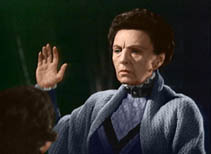
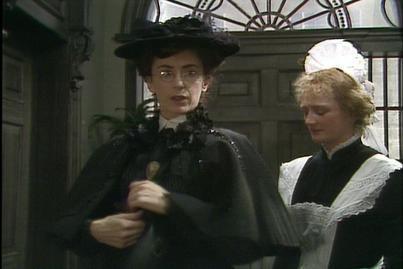
Levi Johnston. Okay, maybe I’m being harsh. He hasn’t done anything obnoxious lately. Unless you count the fact he simply won’t go away. Or maybe it’s because he was published before me. Take your pick.
Medusa from The Rescuers. Wasn’t she awful? I mean, kidnapping little Penny and then making her go find the Devil’s Eye diamond in the dark and scary cave. However, she can be spared the shovel because she was voiced by the wonderful Geraldine Page.
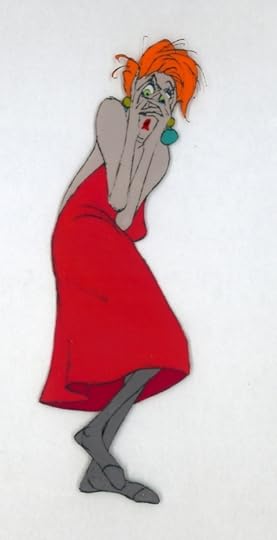
Bradley Raines from Guiding Light. Bradley Raines was the alcoholic stepfather of heroine Beth Raines. We hated him right away (he pushed Beth down the stairs) In one year he managed to beat up Beth’s mom Lillian on a regular basis (played by Tina Sloan, who used to joke her co-stars for years yelled at her “Lillian! Go get me a beer!”) told Phillip Spaulding the truth about his parentage in the worst way possible, took Beth to a OB-GYN to check to see if she was still a virgin, broke the family’s television set, raped Beth while drunk, got a court order to force her to come home (she was scared no one would believe her about the rape) then followed her to New York City and stalked her and Phillip, then had the audacity to ask Lillian to take him back. Whew! Just writing this all down makes me want to hit Bradley with that shovel! Thanks to James Rehborn’s performance, it made Bradley all the more creepy.
Pete Campbell from Mad Men. Oh Pete. He oozes sleaze. From being rude to Peggy, making sexist remarks to Joan (and pimping her out to get the Jaguar account) and cheating on the lovely Trudy on a regular basis. He even raped the au pair in his apartment building. When recovering alcoholic Freddy Rumsen came to work at the SCPD agency, he refused to work with Pete. People across the country cheered when Lane Pryce punched him.

This is my shovel list. What’s on yours?
*Keep in mind no shovels, people, or fictional characters were hurt while writing this blog. We are talking about a metaphorical shovel.
The post You Got The Shovel Honey and I’ve Got the Time appeared first on Jennifer Niven : Everything Books.
September 30, 2012
Viva La Orphelines!
To celebrate Jennifer’s Becoming Clementine making her debut, her blog is taking a French state of mind. Ah, France! Home of Edith Piaf, french bread, croissants, french braids, viva la France!
Oddly when I think of France, I think of the Happy Orphelines. You might be scratching your head, thinking what are the happy orphelines? Merde! You never heard of them! Tsk, tsk!
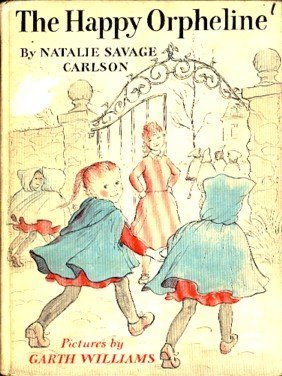
The happy orphelines woudn’t hang out with Annie or Harry Potter. Maybe they would, but they wouldn’t get why they were so sad about having no parents. They were happy about being orphans (orphelines is what they are called in France) They were well fed, well dressed, and went on field trips around Paris; touring the sewers (yes, this was an actual field trip, hard to believe) walking around Paris, having a lovely time.
I loved the books for the stories of course, and the fact that several of the books were done by Garth Williams. I loved Charlotte’s Web, so I knew his drawing style right away. I remember noticing Bridgette and Fern looked alike with their coloring; I almost wondered (and I know this is awful of me) if Mr. Arable was in France during the war. Can we prove that he might’ve fathered a little girl? Who knows? Oh, I went there. Yes, I’ve watched too many soap operas in my time. But there is a similarity.
When I was older I was surprised that Natalie Savage Carlson was not French. She grew up in the South (and wrote a middle grade novel about race relations) yet all the orpheline books are set in France, along with The Family under the Bridge, another middle grade novel that won a Newberry Honor and made into a musical written by Kathie Lee Gifford.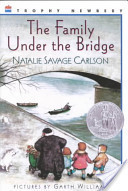
What I loved about the orpheline books is that they loved their lives. Yes, it would be great to have parents, but they had Madame (the woman who ran the orphanage) they had Therese the helper. What more could they want? The orphanage they lived in was falling down all around them, but they had each other. They accepted life as it was. Sometimes that is incredibly hard to do. I’ve been bummed this past week; a possible writing opportunity has been delayed. However, I remembered the orphelines. They accepted whatever was thrown at them, and were grateful for the small things. For me I realized a delay did not mean it was over, kaput. It’s just a delay. Nothing more, nothing less.
When I was little and my mother was done with a book she was reading to me, I would say “Make more!” I wanted more of the story, more of the author. I felt like that when I realized there were no more orphelines books for me to read. But they are forever alive, walking in Paris, happy in the knowledge they were together.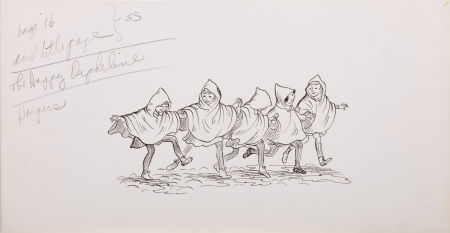

The post Viva La Orphelines! appeared first on Jennifer Niven : Everything Books.
September 27, 2012
The United States of Jennifer
On September 15, I handed in the manuscript for the fourth book in my Velva Jean series (Velva Jean Learns to Drive, Velva Jean Learns to Fly). On Tuesday (Sept. 25) the third book in that series was released: Becoming Clementine.
I have now crawled out from behind my desk, Gollum-like– shrunken, blinking and shuffling into the sunlight– to get ready for the publicity phase of book three. I am trading my yoga pants, yoga tank, and flip-flops for pencil skirts, red lipstick, one very Charlie’s Angels-esque black pantsuit, and suede pumps, and heading out into the world to promote Becoming Clementine. Being an author is much like being Sybil, that famous possessor of multiple personalities. At various times throughout the process of working on a book, a writer needs many different sides.
You need to have a vivid imagination, able to conjure ideas and characters often out of thin air. You need to enjoy detective work and have the patience and determination to come at your research from all angles and track down just what you’re looking for. You need to like being alone, willing and able to happily, diligently spend month after month after month hermited away by yourself as you write and edit your book. You need to have the passion and ferocity of purpose to be at your desk for all that time and see your project through, no matter what– in spite of weariness and struggle and writer’s block and life. You need to be sensitive and observant to draw real, breathing characters. You need to be a critic, able to judge what you’ve written impartially and openly. You need to be analytical and impartial so that you can ruthlessly take your words apart and put them back together again.
You need to be outgoing and at ease in the spotlight, talking to nice folks who want to ask you questions and discuss your work and host you for book events, meeting readers, signing books, doing panels and speeches and book clubs and readings. You need to be tough and resilient to read and hear what people will say about your book– this book you’ve been pouring over and bleeding into and sacrificing everything for. (As my mother says, “To be a writer, you need to have the soul of an angel and the hide of an armadillo.”) You need to have enough stamina and fortitude to come up with an idea and do it all over again.
Book four will boomerang back to me sometime in the fall with my editor’s changes/notes/edits/suggestions/cuts, but for now it’s all about Becoming Clementine. It’s that time in a book’s life when I’m making the rounds, doing interviews, gathering reviews, answering questions, going on tour, etc. I love this part of it, even though it also carries its own degree of stress: reviews, feedback, sales. But I’m planning to enjoy it. After all, soon enough it will be time to pull on the yoga pants and retreat into the cave once again.
The post The United States of Jennifer appeared first on Jennifer Niven : Everything Books.












